A divided and skeptical House committee introduced a late-session school choice bill.
The proposal would create a state tax credit for parents who send their children to private school, or homeschool their children.
The credits would max out at $1,300 for the first child, and then decrease: $900 for a second child, $500 for a third child, and $200 thereafter.
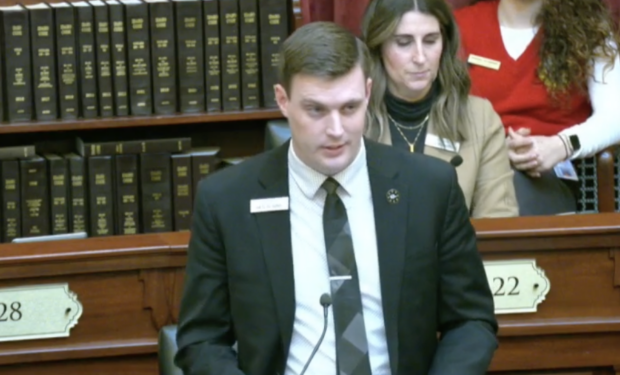
The sponsor, Sen. Ben Adams, R-Nampa, called a school choice option “that I think we can all work with.”
House Revenue and Taxation Committee members questioned Adams about the costs. The bill directs the Legislature to put “no less than” $30 million into the tax credits.
Adams said he has “overestimated” the costs, saying the $30 million would cover 23,000 tax credits, at $1,300 apiece.
But Adams also said no one knows how many children are homeschooled in Idaho — so it’s unclear how many homeschooling parents would seek a tax credit. About 17,000 students attend private schools.
Committee members also questioned whether Adams’ bill has a chance of getting through both houses in the waning days of the 2023 legislative session.
“If the right people want something to move, it will move,” Adams said.
Rep. Kenny Wroten was unconvinced, saying the school choice debate has played itself out for 2023. “It has been asked and answered, in a lot of different ways,” said Wroten, R-Nampa.
Others said Adams’ bill at least deserved a full hearing, and a chance to advance. “I’m up for a magic show,” said Rep. Jerald Raymond, R-Menan.
Revenue and Taxation introduced the bill on a 9-6 vote, paving the way for a possible hearing at a later date.
Higher ed budget moves forward, despite concerns
The Senate approved a higher education spending plan Tuesday, over critics’ questions about indoctrination at state colleges and universities.
The controversial budget bill includes $353.9 million of taxpayer money for Idaho’s public four-year schools: Boise State University, University of Idaho, Idaho State University and Lewis-Clark State College. Beyond this general fund money, the schools would receive an additional $324.6 million, largely from student tuition and fees.
The budget got the seal of approval from the Joint Finance-Appropriations Committee earlier in March, but division from committee spilled over onto the Senate floor Tuesday.
Sen. Scott Herndon, R-Sagle, voted against the budget during JFAC deliberations. He proposed an alternate budget that would have cut nearly $5 million to eliminate “social justice” staff, and cut funding for Boise State Public Radio. Herndon’s proposal failed by a wide margin.
But the committee added language prohibiting the schools from using state money to support “diversity, equity, inclusion or social justice ideology as part of any student activities, clubs, events or organizations on campus.”
Still, Herndon says it isn’t enough.
During Tuesday’s debate, Herndon called out Boise State for providing programming geared toward LGBTQ+ students, and recruiting author and activist Ibram X. Kendi to speak at the school’s Martin Luther King Jr. Day event.
Herndon said JFAC’s language wouldn’t cover some staff positions of concern. “I want to make everybody in the body aware of what we’re possibly paying for.”
And Sen. Brian Lenney of Nampa said Idaho colleges are “ground zero” for political indoctrination.
Lenney cited language in Boise State job application, requiring a commitment to cultivating a diverse and inclusive environment.
Sen. Geoff Schroeder, R-Mountain Home, said opponents were making an “inferential leap.” Diversity, equity and inclusion policies help schools avoid litigation. “It is preventing further waste and further loss of student funds,” he said.
Sen. Carrie Semmelroth, D-Boise, said much of the DEI programming at Boise State is driven by student leadership, clubs and organizations, not administrators. Semmelroth is a Boise State employee.
After around 45 minutes of debate, the bill passed 22-13. The no votes came from Republican Sens. Carl Bjerke, Coeur d’Alene; Cindy Carlson, Riggins; Lori Den Hartog, Meridian; Dan Foreman, Moscow; Phil Hart, Kellogg; Herndon; Todd Lakey, Nampa; Lenney; Tammy Nichols, Middleton; Doug Okuniewicz, Hayden; Ben Toews, Coeur d’Alene; Chris Trakel, Caldwell; and Glenneda Zuiderveld, Twin Falls.
JFAC moves two ‘trailer bills’ out of neutral
Wrapping up some late-session work, the Joint Finance-Appropriations Committee took care of some education spending items.
Career-ready programs. JFAC earmarked $50 million to expand career-technical education programs in rural Idaho.
This spending proposal — a “trailer bill,” in Statehouse parlance — would fund a one-time CTE expansion plan, backed by state superintendent Debbie Critchfield. The CTE bill has already passed the House and awaits a Senate vote.
The $50 million would come from an in-demand careers fund, created during September’s one-day special legislative session.
The $50 million bill passed on a 15-3 committee vote: Sen. Scott Herndon, R-Sagle, and Reps. Tina Lambert, R-Caldwell, and Josh Tanner, R-Eagle, voted no.
Idaho Launch. JFAC also earmarked $5 million to start up Idaho Launch, Gov. Brad Little’s controversial plan to provide incentives for high school graduates who pursue in-demand careers.
This “trailer bill” would fund the state’s Workforce Development Council, which would administer the Idaho Launch program. The money would allow the council to add six full-time positions.
The Idaho Launch proposal is also in the middle of the legislative pipeline. The House has passed an Idaho Launch bill; this awaits a Senate vote, along with a companion bill.
Both trailer bills must pass the House and the Senate.
House rejects advisory question bill
A bill calling for a school choice advisory question failed in the House Tuesday.
House Bill 339 sought to put the ESA/voucher debate to a statewide vote — asking voters if they support putting public money into private, religious and for-profit education. Sponsor Rep. Lori McCann said her goal was to get a clear picture of what Idahoans truly want regarding one of the state’s hottest education debates.
The bill met strong resistance. Opponents said the bill’s language is too biased, and could lead voters to one conclusion over another. Most agreed that avoiding that subjectivity is nearly impossible.
Statehouse tensions snuck into the debate.
Rep. Wendy Horman criticized McCann, R-Lewiston, for routing the bill through the House Education Committee, instead of State Affairs.
“Some of us have been playing by the rules this year,” said Horman, R-Idaho Falls.
Horman’s school choice bill, which would expand the Empowering Parents grant program to subsidize private education, will go through House Education Wednesday. Earlier in the session, McCann questioned whether the committee would see Horman’s bill after it was pulled from the agenda.
McCann denied trying to circumvent Statehouse procedure.
After hearing from a string of opponents, McCann was taken aback.
“I am really surprised, and a little bit disappointed, that we would be so afraid to get the will of the people,” McCann said.
The bill died in a 27-43 vote.
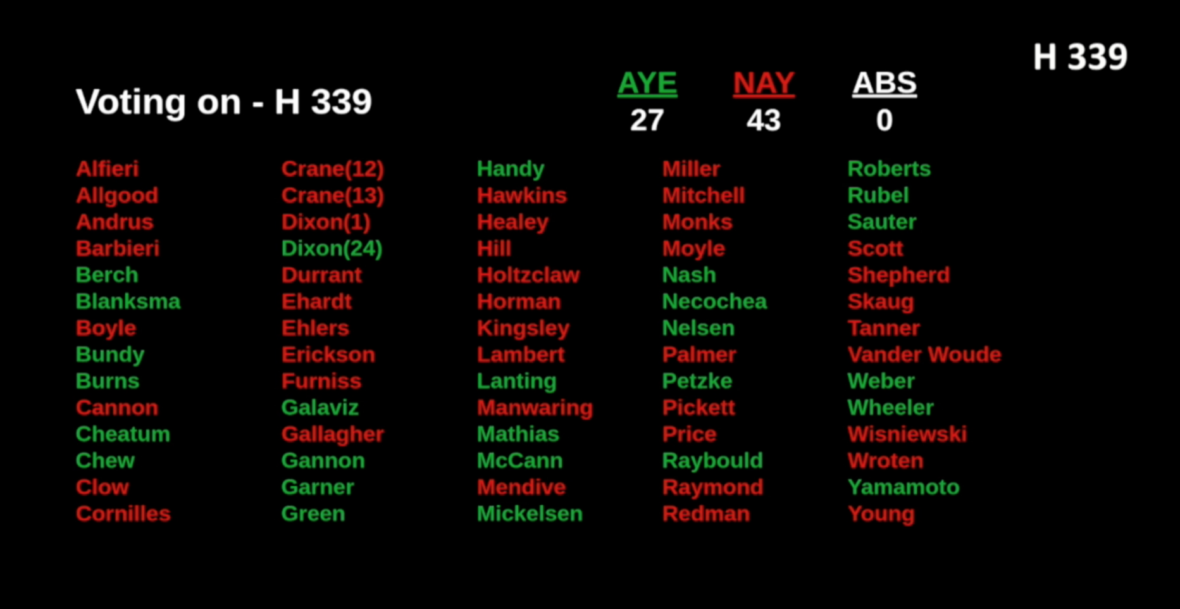
Community college budget passes House
Without debate, the House passed a $60 million budget for Idaho’s four community colleges. The bill passed on a 45-22 vote.
Though none of the opponents voiced their concerns, the vote suggests some pushback over budget cuts at North Idaho College — the Coeur d’Alene-based community college that has gained national attention in recent months. NIC’s accrediting organization threatened the college after a series of administrative and financial mishaps.
The community college budget zeroes out three administrative hires at NIC, plowing the $454,300 into pay raises at the four colleges, including NIC.
Eight out of 10 North Idaho representatives voted against the budget. Rep. Joe Alfieri of Coeur d’Alene was absent for the vote, and Rep. Mark Sauter, R-Sandpoint, voted in favor of the bill.
The budget now goes to the governor’s desk.
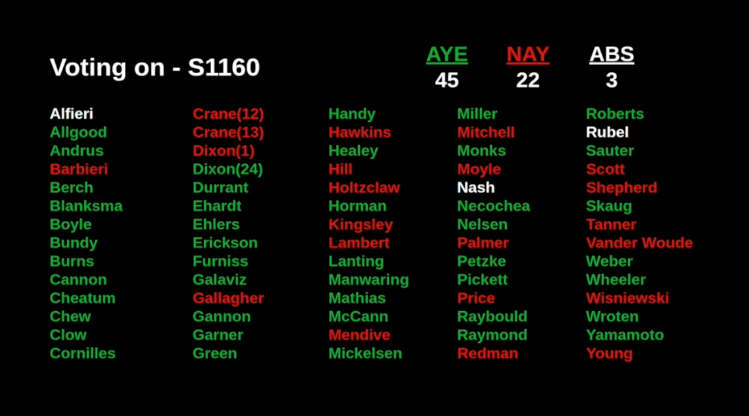
House passes open enrollment, apprenticeship bills
The House quickly passed a pair of education-related bills Tuesday afternoon, sending them to Gov. Brad Little’s desk.
Open enrollment. Senate Bill 1125 would rewrite Idaho’s open enrollment law for the first time in three decades. Every school district would now be required to allow open enrollment, and post their policies online.
Parents would be able to enroll their children at any time of the school year. Students who attend a school for two years under an open enrollment policy “may complete” their education at that school.
The bill passed 63-5, over the objections of Boise Democrats Steve Berch, Soñia Galaviz, John Gannon, Colin Nash and Lauren Necochea.
Apprenticeships. Senate Bill 1069 would set up the framework to allow college students to work as paid classroom apprentices as they pursue their bachelor’s degree in education.
The bill passed unanimously.
House committee approves dino bill, another win for Idaho students
Idaho’s homegrown dinosaur is one step closer to becoming a state symbol after a unanimous vote in support from the House State Affairs Committee.
In a brief respite from the end-of-session frenzy, lawmakers heard from a group of beguiling fourth-graders Tuesday morning about one of Idaho’s oldest residents — the oryctodromeus. The passionate students have spent the past month lobbying for Senate Bill 1127, which would make the oryctodromeus Idaho’s state dinosaur.
“If you’ve never been lobbied by a bunch of fourth-graders, you have missed out,” said bill sponsor Sen. Kevin Cook, kicking off Tuesday’s committee meeting.
At first, the Idaho Falls senator was reluctant to take on the seemingly inconsequential bill. But, like so many others, Cook couldn’t fight off the persuasive power of 10-year-olds.
“There’s more to legislation than just grown-up stuff,” said Cook. “I believe that this is an important bill. It’s important for fourth-graders and important for our future.”
Eight students testified in favor of SB 1127, on behalf of hundreds of others across the state. They recited a checklist of reasons why the oryctodromeus deserves to be enshrined in Idaho law.
For one, the dino is unique to Idaho.
Roughly 95 million years ago, the small-statured herbivore settled in Southeast Idaho (and part of Montana). A full oryctodromeus skeleton has only been discovered in the Gem State.
And like Idahoans, said Harper Lehman of Montessori Academy, the dinosaur worked hard to keep itself and its family safe. It was known for its unique burrowing habits, used to create a safe haven for itself and its young.
Jedidiah Wheeler of Rimrock Elementary called on lawmakers to raise Idaho to the status of neighboring states, like Wyoming and Utah, which already have their own state dinosaurs.
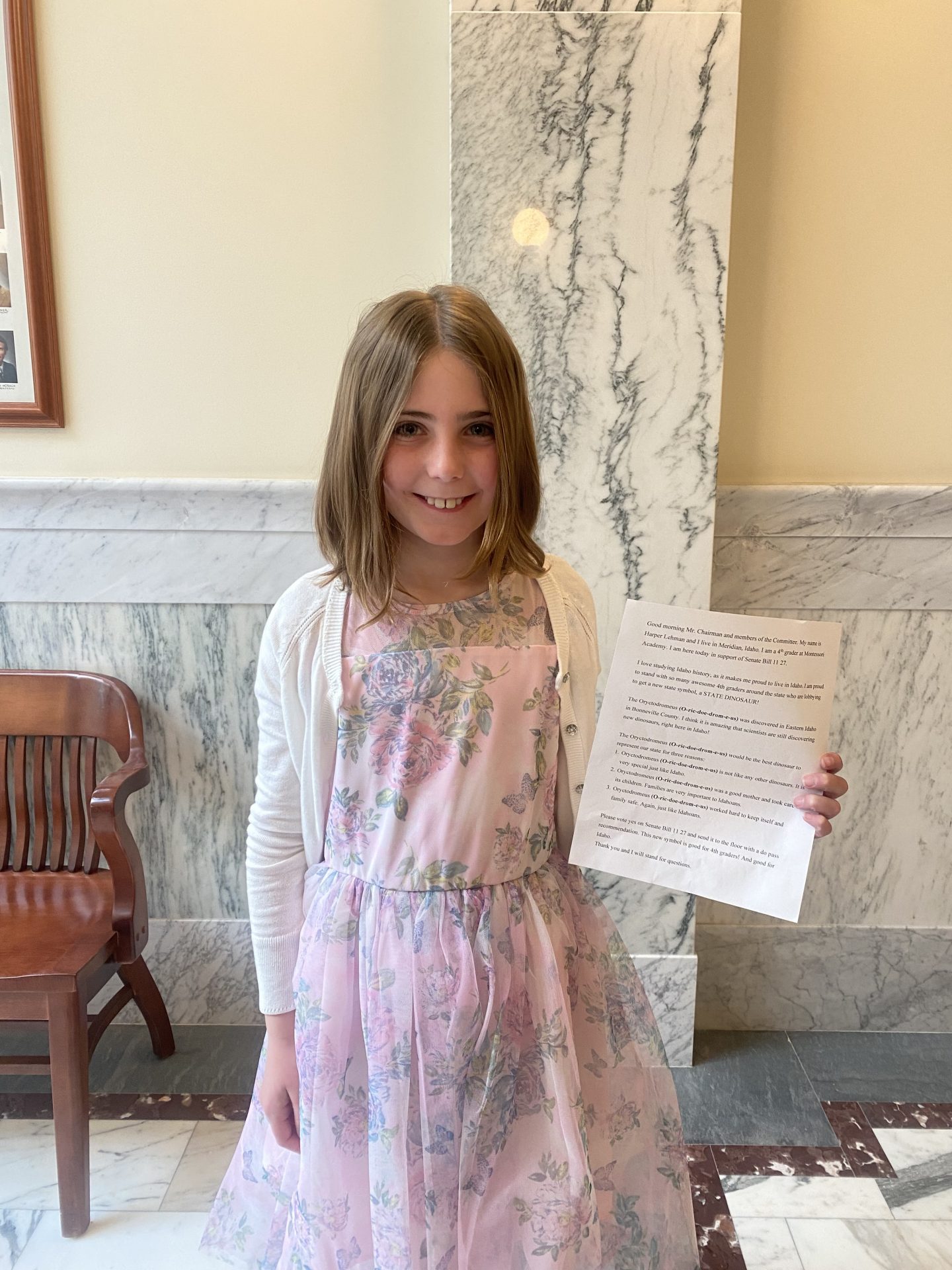
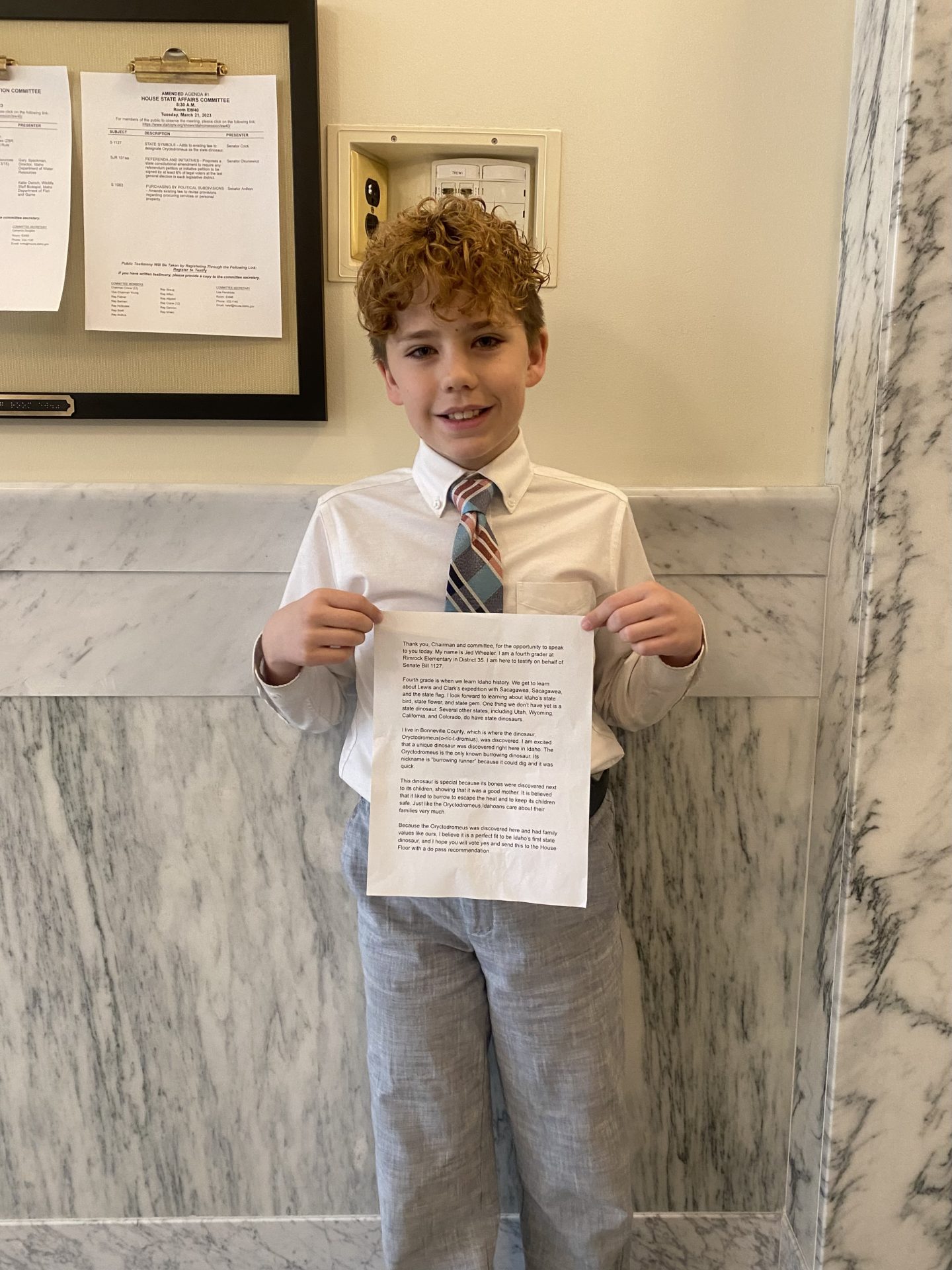
Ucon Elementary School teacher Joel Walton (the teacher behind SB 1127) spoke to the excitement the dinosaur brings to his fourth-grade classroom, and beyond. He never imagined that excitement would spread to students in Boise and Meridian, he told the committee Tuesday.
“I didn’t realize this thing had gotten so big,” Walton said. “It’s an absolute delight to me.”
The committee quickly approved the bill with a unanimous vote.
Rep. Brooke Green, D-Boise, commended the students on their well-crafted testimonies. “Us representatives should take notes.”
SB 1127 now heads to the House floor for final consideration.
